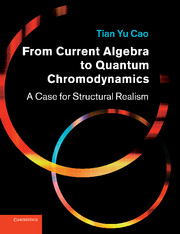Book contents
- Frontmatter
- Contents
- Preface
- 1 Introduction
- 2 The rise of current algebra
- 3 Sum rules
- 4 Saturation and closure
- 5 Scaling
- 6 Theorizations of scaling
- 7 The advent of QCD
- 8 Early justifications and explorations
- 9 Structural realism and the construction of QCD
- 10 Structural realism and the construction of the CA–QCD narrative
- References
- Author index
- Subject index
2 - The rise of current algebra
Published online by Cambridge University Press: 06 December 2010
- Frontmatter
- Contents
- Preface
- 1 Introduction
- 2 The rise of current algebra
- 3 Sum rules
- 4 Saturation and closure
- 5 Scaling
- 6 Theorizations of scaling
- 7 The advent of QCD
- 8 Early justifications and explorations
- 9 Structural realism and the construction of QCD
- 10 Structural realism and the construction of the CA–QCD narrative
- References
- Author index
- Subject index
Summary
Murray Gell-Mann's proposal of current algebra in 1962 (Gell-Mann,1962) was an important step in the conceptual development of particle physics. In terms of insights, imagination, and consequences, this strategic move ranks among the highest scientific creativity in the history of fundamental physics. When the proposal first appeared, however, because of its mathematical complication and conceptual sophistication, it was perceived by most particle physicists to be too esoteric to understand or see its relevance and applicability. Even today, more than four decades later, with the advantage of hindsight, it remains difficult to properly assess its role in the history and understand why and how it played the role it did.
The difficulty lies not so much in Gell-Mann's idiosyncratic ingenuity but in, first, the puzzling situation of particle physics to which Gell-Mann's proposal was a response, and, second, in the bewildering trajectory of the subsequent development, which was shaped mainly by the competition between various speculative ideas and, ultimately, by the interplays between experiments and theorizing. The aim of this chapter is to address the first aspect of the difficulty, postponing the second to subsequent chapters.
Context
When Gell-Mann proposed his current algebra to deal with hadron physics, there was no accepted theory of strong interactions. Worse, there was no theory of how hadrons interacted with each other at all.
- Type
- Chapter
- Information
- From Current Algebra to Quantum ChromodynamicsA Case for Structural Realism, pp. 14 - 48Publisher: Cambridge University PressPrint publication year: 2010



